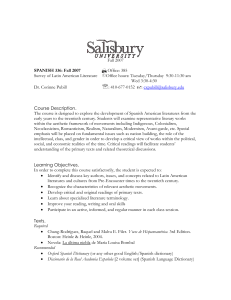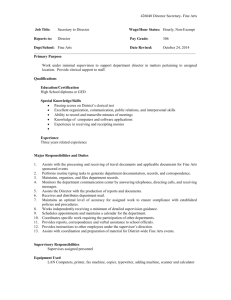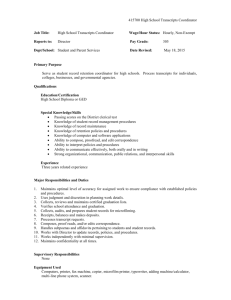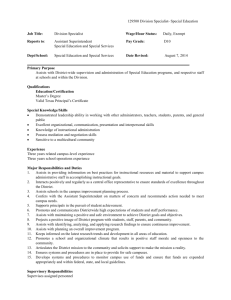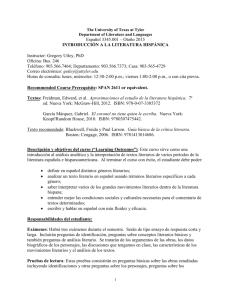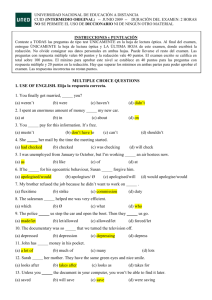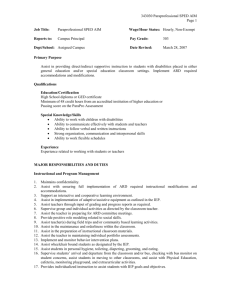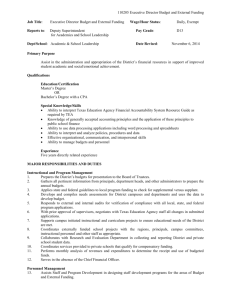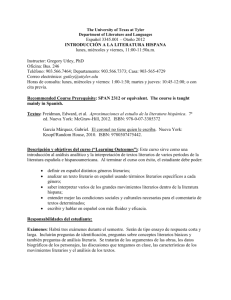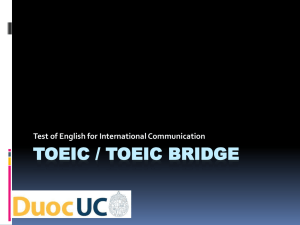4 Course Name: Survey of Latin American Literature Gen Ed Cr: Yes
advertisement
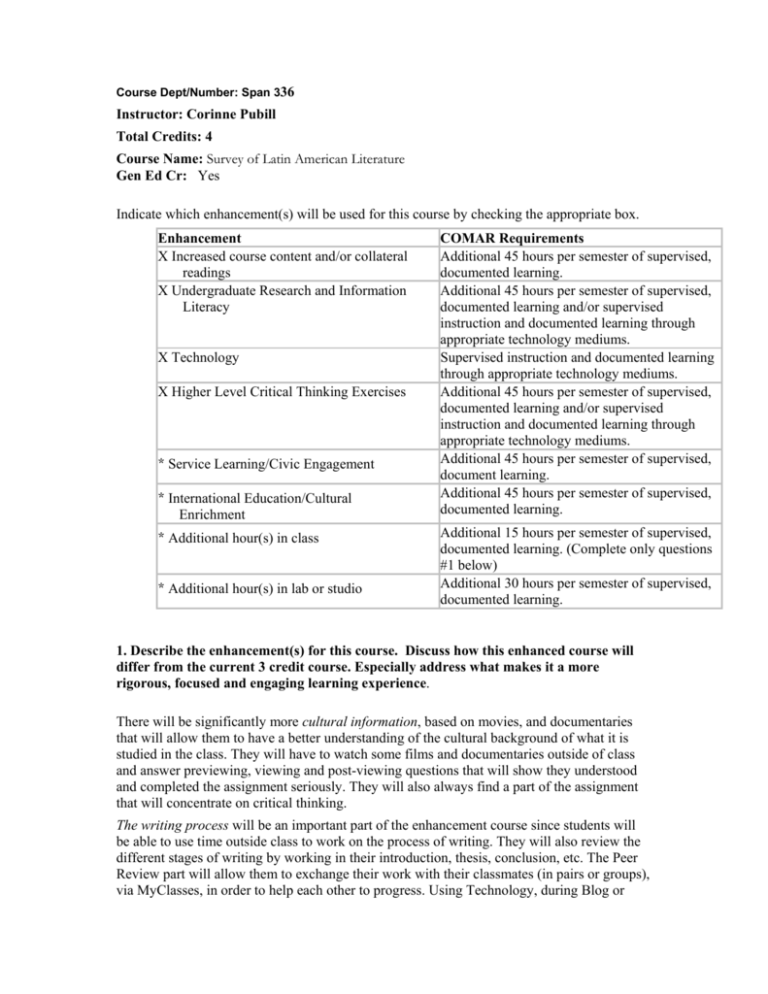
Course Dept/Number: Span 336 Instructor: Corinne Pubill Total Credits: 4 Course Name: Survey of Latin American Literature Gen Ed Cr: Yes Indicate which enhancement(s) will be used for this course by checking the appropriate box. Enhancement X Increased course content and/or collateral readings X Undergraduate Research and Information Literacy X Technology X Higher Level Critical Thinking Exercises * Service Learning/Civic Engagement * International Education/Cultural Enrichment * Additional hour(s) in class * Additional hour(s) in lab or studio COMAR Requirements Additional 45 hours per semester of supervised, documented learning. Additional 45 hours per semester of supervised, documented learning and/or supervised instruction and documented learning through appropriate technology mediums. Supervised instruction and documented learning through appropriate technology mediums. Additional 45 hours per semester of supervised, documented learning and/or supervised instruction and documented learning through appropriate technology mediums. Additional 45 hours per semester of supervised, document learning. Additional 45 hours per semester of supervised, documented learning. Additional 15 hours per semester of supervised, documented learning. (Complete only questions #1 below) Additional 30 hours per semester of supervised, documented learning. 1. Describe the enhancement(s) for this course. Discuss how this enhanced course will differ from the current 3 credit course. Especially address what makes it a more rigorous, focused and engaging learning experience. There will be significantly more cultural information, based on movies, and documentaries that will allow them to have a better understanding of the cultural background of what it is studied in the class. They will have to watch some films and documentaries outside of class and answer previewing, viewing and post-viewing questions that will show they understood and completed the assignment seriously. They will also always find a part of the assignment that will concentrate on critical thinking. The writing process will be an important part of the enhancement course since students will be able to use time outside class to work on the process of writing. They will also review the different stages of writing by working in their introduction, thesis, conclusion, etc. The Peer Review part will allow them to exchange their work with their classmates (in pairs or groups), via MyClasses, in order to help each other to progress. Using Technology, during Blog or Chat Time, they will have to go to the blog page and discuss with their classmates about different topics of the class. More Undergraduate Research and critical thinking will occur with two additional critical commentaries in Spanish based on a critical article. These assignments require that students offer a brief summary of the salient issues presented by the critic (1 paragraph) and a mini analysis of the relevance of the piece to the topics/readings discussed in class (2 paragraphs). These papers will help student to combine textual analysis and a more abstract discussion of a specific topic. 2. Discuss what the faculty member will do to provide appropriate guidance and feedback for the enhancement activity. I will read and grade all of the students’ assignments. Students have to read carefully the assigned material in order to be able to complete the assignments. I will also give students extensive feedback that will help them to improve their work. 3. Discuss the estimated time expected for students to complete the enhancement (COMAR requires approximately 45 hours per 1 credit): More Cultural information with 2 extra films and specific questions. 3 hours each = 6 hours. More Cultural information with 2 documentaries: one will take 1h30 and the other one 3h00 including questions = 4 hours 30 mn. More Cultural information with work on Youtube sites on key writers, including questions = 2 hours. More writing with 3 Writing assignments. 3 hours each = 9 hours. 3 Peer Review Activity based on the writing assignments. 1hours 30 for each = 4h30. More critical thinking with two additional critical commentary in Spanish based on a critical article= 3 hours for the article in Spanish, 2 hours for the one in English = 5 hours. More critical thinking with an additional critical commentary that was before in English and it is now in Spanish = 1 hour. More Reading with additional material on primary text = 1 hour. More writing with blogs on MyClasses where students will have to discuss on different topics related to the class. 2 sessions of 2 hours each = 4 hours. More writing and reading in Spanish with a second presentation = 3 hours. More writing and reading in Spanish with a longer final paper (10 pages instead of 5)= 5 hours. 4. Discuss how the enhancement will be assessed. The enhancement will be assessed depending on the way students will be answering the questions related to the films, the documentaries and youTube they saw outside of class. This work will correspond to 10% of the grade I will assess the writing assignments and the Peer Review activities depending on students critical analysis of texts and the evolution on their work and also the commentaries given by their peer. It will correspond to 10% of the grade. To conclude, the enhancement will be assessed throughout the semester, through daily group/pair discussion, as well as exercises, quizzes, exams, presentation, commentaries, and papers. Fall 2007 SPANISH 336: Fall 2007 Survey of Latin American Literature Dr. Corinne Pubill + Office: 385 ¦Office hours: Tuesday/Thursday 9:30-11:30 am Wed 3:30-4:30 ℡: 410-677-0152 |: cxpubill@salisbury.edu Course Description. The course is designed to explore the development of Spanish American literatures from the early years to the twentieth century. Students will examine representative literary works within the aesthetic framework of movements including Indigenous, Colonialism, Neoclassicism, Romanticism, Realism, Naturalism, Modernism, Avant-garde, etc. Special emphasis will be placed on fundamental issues such as nation building, the role of the intellectual, class, and gender in order to develop a critical view of works within the political, social, and economic realities of the time. Critical readings will facilitate students’ understanding of the primary texts and related theoretical discussions. Learning Objectives. In order to complete this course satisfactorily, the student is expected to: • Identify and discuss key authors, issues, and concepts related to Latin American literatures and cultures from Pre-Encounter times to the twentieth century. • Recognize the characteristics of relevant aesthetic movements. • Develop critical and original readings of primary texts. • Learn about specialized literature terminology. • Improve your reading, writing and oral skills • Participate in an active, informed, and regular manner in each class session. Texts. Required • Chang-Rodríguez, Raquel and Malva E. Filer. Voces de Hispanoamérica. 3rd Edition. Boston: Heinle & Heinle, 2004. • Novela: La última niebla de María Louisa Bombal Recommended • Oxford Spanish Dictionary (or any other good English/Spanish dictionary) • Diccionario de la Real Academia Española [2 volume set] (Spanish Language Dictionary) • A great online resource is: Diccionario de la Real Academia online “búsqueda” (search): http://buscon.rae.es/diccionario/drae.htm Grading. The final grade will be calculated as follows: Preparation, participation, quizzes 20% Critical commentary 15% Oral Presentation 15% Exams (2) 30% Final paper Grading scale: 100-90 = A 89-80 = B 79-70 = C 69-64.5 = D 64.4 and below, = F 20% 100% Course policies. Preparation and Participation: You must come to class well prepared. All the materials detailed in the syllabus for each class should be read/prepared in advance. Your active participation in pairs and group work is an important part of the class (20% of your grade), so it is essential that you come to class prepared and ready to participate. Critical commentary (comentario): You will turn in a total of five one-page, single-spaced analytical commentaries on a critical article selected by the instructor and its potential application to better understand any of the readings covered in the previous weeks. These assignments require that students offer a brief summary of the salient issues presented by the critic (1 paragraph) and a mini analysis of the relevance of the piece to the topics/readings discussed in class (2 paragraphs). These papers will help you to combine textual analysis and a more abstract discussion of a specific topic. Guidelines will be provided. Oral presentation: Each student will give an oral presentation of 7-10 minutes to introduce and offer a preliminary analysis of a primary text. Students are expected to incorporate information from at least one outside critical source listed in the MLA bibliography (i.e. a journal article or book article by a critic in the field) in order to defend their reading of the text. The student will give a brief handout to the class (written in Spanish) that includes the information covered as well as three original questions for the group to discuss. This activity will allow you polish your presentation skills in Spanish, permit you share a mini analysis of the critical features of a primary text, and facilitate a critical discussion of the work with your classmates. Guidelines will be provided. Exams: As part of the course you will have two in-class exams that will examine your knowledge of readings, concepts, and materials discussed in class. Exam format will include multiple choice or T/F, short answer questions, and at least one essay question. Exams will take the whole class period. Make-ups: Make-ups for exams, response papers, or essays will only be given for official conflicts or verified medical reasons. Arrangements must be made with the instructor prior to the date listed on the syllabus. Final paper: Your final project will be a critical analysis of one relevant topic related to the novel María Bombal La última niebla. The paper will be 5 pages long, double-spaced, and must follow the MLA format. Accents and other diacritical marks MUST be included in order to receive a grade. You are required to consult and cite at least two critical articles on the novel, which will be available on MyClasses. No late work will be accepted. Guidelines will be provided. IMPORTANT INFORMATION Writing assignments are assigned with Writing Across the Curriculum in mind. The transfer of writing skills form one language to another enhances the ability to write well in both English and Spanish. Evaluation of written assignments will be bases on both form and content. Attendance: Your attendance, punctuality, and active participation are crucial for the successful completion of this course. You are required to attend all classes and to be prepared to begin work each day at the appointed time. A maximum of TWO absences will be allowed. If for any reason a student exceeds this amount, it is recommended that they drop the course, given that with each additional absence will affect the students’ grade. Half a letter grade will be deducted for each subsequent absence. Arriving late or leaving early (unless excused) more than two times will be considered absences. Students are responsible for finding out about the assignments if they miss a class. Academic integrity violations: Students are expected to complete all assignments and activities for this course in accordance with the Principles of Academic Integrity. At Salisbury University, plagiarism and cheating are wrong and are considered acts pf “academic dishonesty” i.e. a deliberate and deceptive misrepresentation of one’s own work. See the SU Student Handbook regarding cheating, plagiarism, and illicit collaboration, and the penalties for these offenses. NOTE: TO REMAIN ENROLLED IN THIS COURSE, YOU MUST SIGN THE FULTON ACADEMIC INTEGRITY PLEDGE AND TURN IT IN TO ME BY THE NEXT CLASS! WAC STATEMENT: Homework, writing assignments, and papers are assigned with Writing Across the Curriculum in mind. The transfer of writing skills from one language to another enhances the ability to write well in both English and Spanish. Evaluation of your writing will be based on both form and content. PROGRAMA TENTATIVO Leer Voces Completar en Voces Leer material de MyClasses o fotocopias Leer la novela La última niebla Comentario crítico LExamen Presentación DIA EN CLASE Semana 1: Las raíces y la época colonial. 28 de agosto Introducción Estudio de la geografía Preguntas y discusión en grupos 30 de agosto Popol Vuh «Las antiguas historias del Quiché» Crístobal Colón «Carta a Luis de Santángel » Semana 2: La colonia. 4 de septiembre Bartolomé de las Casas “Historias de las Indias” 6 de septiembre « Yo. la peor de todas » de María Luisa Bemberg, 1990 Semana 3: Texto como crítica. 11 de septiembre El Inca Garcilaso de la vega « Comentarios reales de los Incas » 13 de septiembre Sor Juana Inés de la Cruz « Respuesta a Sor Filotea » « Redondillas» Comentario #1: Las tretas del débil Semana 4: Neoclasicismo y romanticismo. 18 de septiembre Andrés Bello “La agricultura de la zona tórrida” “Autonomía cultural de América” 20 de septiembre José María Heredia “Niágara” “A mi esposa” Comentario #2: What is a Nation? Actividad en grupo: El concepto de la nación. Semaine 5: Proyectos nacionales. 25 de septiembre Domingo Faustino Sarmiento TAREA PARA ESTE DIA p.2-3 (1.1-1.4), p.13-17. Preguntas generales (1-2), preguntas de análisis (1) en p.21. p.23-26 Preguntas generales en p.27, preguntas de análisis (1-5) p5 (1.4.2) p.28-35. Preguntas generales (1-3), preguntas de análisis (1-3) en p. 35. Leer y contestar a las preguntas sobre la película p.6 (1.5, 1.6) p.61-68. Preguntas generales (1-3), preguntas de análisis (1-3, 5-6) en p. 68. p.75-83. Preguntas generales (1-4), preguntas de análisis (1-3) en p.85. “Las tretas del débil”, Josefina Ludmer p. 93-98. Preguntas generales y preguntas de análisis en p.99. p. 102-109. Introducción a “Búsqueda de la emancipación cultural (1825-1882)”. p. 111-112; 114-117. Preguntas generales y preguntas de análisis (2-7) en p. 118. “What is a Nation?”, Ernest Renan p. 1-30. p. 137-139; 140-152. Preguntas generales y preguntas de análisis en p. 152. 27 de septiembre “Bases y puntos de partida para la organización de la República Argentina”. (Selección) “The ordered city”, de Ángel Rama. p.31-55. Semana 6: Mujeres contra sistema político e indigenismo. 2 de octubre Contestar a las preguntas “Camila” de María Luisa Bemberg, 1985 Facundo (selección) Presentaciones Juan Bautista Alberdí “Bases y puntos de partida para la organización de la República Argentina” (selección) Comentario #3: The ordered City 4 de octubre “Camila” de María Luisa Bemberg, 1985 Presentaciones Semana 7: Literatura abolicionista. 9 de octubre L Examen 1 11 de octubre Gertrudis Gómez de Avellaneda Sab (selección) Semana 8: Modernismo. 16 de octubre José Martí Versos sencillos “V” “Nuestra América” Comentario #4: “Irresistible Romance: The Foundational Fictions of Latin America.” 18 de octubre Rubén Darío “El cisne” “Sonatina” Semana 9: Las mujeres y el modernismo. 23 de octubre Delmira Agustini “El intruso” “Las alas” 25 de octubre Alfonsina Storni “Tú me quieres blanca” “Cuadrados y ángulos” Contestar a las preguntas p. 56-71. p. 154-155. Sab (selección) Completar las preguntas de análisis y reflexión p 71-110. p. 207-209; 211; 216-220. Preguntas generales y preguntas de análisis (#8) en p. 221. “Irresistible Romance: The Foundational Fictions of Latin America,” Doris Sommer. p. 198-206 Introducción a “La realidad americana y la renovación literaria (1882-1910)”. p. 240-241; 245-247. Preguntas generales y preguntas de análisis (2 y 4) en p. 256-257. p 111-135. p. 308-309; 310-311. Preguntas generales y preguntas de análisis (1,2,6) en p. 313. p. 327-328 y 341-342. Preguntas generales y preguntas de análisis (1,2,4) en p. 331. “Hombre pequeñito” Presentaciones Quiz Semana 10: El vanguardismo poético. 30 de octubre Vicente Huidobro “Nipona” “Arte poética” Presentaciones 1 de noviembre Pablo Neruda “Walking around” “Alturas de Macchu Picchu” p 135-162. p. 339-340; 341-342 Preguntas generales y preguntas de análisis (1 y 2) en p. 345. p.424-426; 428-431. Preguntas generales y preguntas de anális en p. 433-434. p. 162-180. Semana 11: Novela corta. 6 de noviembre Jorge Luis Borges p.383-385; 387. “Borges y yo” Preguntas generales y preguntas de Entrevistas análisis (2) en p.392. Presentaciones 8 de noviembre p. 181-192. LExamen 2. Semana 12: Lo real maravilloso y el realismo mágico. 13 de noviembre Alejo Carpentier p.380-390. “Guerra del tiempo” Preguntas generales Comentario #5: “De lo real “De lo real maravilloso americano,” maravilloso” Alejo Carpentier Presentaciones 15 de noviembre Gabriel García Márquez p.516-518; 518-524. “La prodigiosa tarde de Baltazar” Preguntas generales y preguntas de análisis (1 y 2) en p. 524-525. Semana 13: La novela. 20 de noviembre María Luisa Bombal Preparar presentaciones La última niebla Presentaciones 22 de noviembre No hay clase Semana 14: 27 de noviembre María Luisa Bombal Preparar presentaciones La última niebla Presentaciones 29 de noviembre María Luisa Bombal Preparar presentaciones La última niebla Presentaciones Semana 15: 4 de diciembre María Luisa Bombal Preparar presentaciones La última niebla Presentaciones 6 de diciembre Repaso ENTREGAR EL TRABAJO FINAL EL 12 DE DICIEMBRE antes de las 8 pm SPANISH 336 – Fall 2008 Survey of Latin American Literature Dr. Corinne Pubill + Office: 385 ¦Office hours: Tuesday/Thursday 9:30-11:30 am Wed 3:30-4:30 ℡: 410-677-0152 |: cxpubill@salisbury.edu Course Description. The course is designed to explore the development of Spanish American literatures from the early years to the twentieth century. Students will examine representative literary works within the aesthetic framework of movements including Indigenous, Colonialism, Neoclassicism, Romanticism, Realism, Naturalism, Modernism, Avant-garde, etc. Special emphasis will be placed on fundamental issues such as nation building, the role of the intellectual, class, and gender in order to develop a critical view of works within the political, social, and economic realities of the time. Critical readings will facilitate students’ understanding of the primary texts and related theoretical discussions. SPAN 366 is an “enhanced” course; that is, a course that might traditionally be offered for 3 credit hours, but which, within the context of both the newly reformed Spanish program and the Fulton School’s overall curriculum reform initiative, is being offered here in a 4-credit context. The main purpose of the Fulton reform and the courses in it is to engage students more in the individual courses they take and, as a result, provide students with a deeper — and often more active—learning experience and encounter with the subject at hand. All "enhanced," 4-credit courses in the Fulton School will require significantly more—and sometimes different—work than they might (or used to) require as 3-credit courses. For more information on the Fulton reform and "enhanced" courses, and what both mean to you, as a student, please visit the Fulton reform student website at http://www.salisbury.edu/fulton/currref-students.html. Learning Objectives. In order to complete this course satisfactorily, the student is expected to: - Identify and discuss key authors, issues, and concepts related to Latin American literatures and cultures from Pre-Encounter times to the twentieth century. - Recognize the characteristics of relevant aesthetic movements. - Develop critical and original readings of primary texts. - Learn about specialized literature terminology. - Improve your reading, writing and oral skills. - Participate in an active, informed, and regular manner in each class session. Texts. Required • Chang-Rodríguez, Raquel and Malva E. Filer. Voces de Hispanoamérica. 3rd Edition. Boston: Heinle & Heinle, 2004. • Novela: La última niebla de María Louisa Bombal Recommended • Oxford Spanish Dictionary (or any other good English/Spanish dictionary) • • Diccionario de la Real Academia Española [2 volume set] (Spanish Language Dictionary) A great online resource is: Diccionario de la Real Academia online “búsqueda” (search): http://buscon.rae.es/diccionario/drae.htm Grading. The final grade will be calculated as follows: Preparation, participation, quizzes 15 Response papers (Comentarios) 15% Oral Presentations 15% Writing Assignments, Peer Review Exams (2) 10% 20% Final paper 15% 100% Assignments on Films, YouTube 10% Grading scale: 100-90 = A 89-80 = B 79-70 = C 69-64.5 = D 64.4 and below, = F Course policies. Preparation and Participation: You must come to class well pr epared. All the materials detailed in the syllabus for each class should be read/prepared in advance. Your active participation in pairs and group work is an important part of the class (15% of your grade), so it is essential that you come to class prepared and ready to participate. Response papers (comentarios): You will turn in a total of seven one-page, single-spaced analytical commentaries on a critical article selected by the professor and its potential application to better understand any of the readings covered in the previous weeks. These assignments require that students offer a brief summary of the salient issues presented by the critic (1 paragraph) and a mini analysis of the relevance of the piece to the topics/readings discussed in class (2 paragraphs). These papers will help you to combine textual analysis and a more abstract discussion of a specific topic. Guidelines will be provided. Oral presentation: Each student will give two oral presentations of 10-12 minutes to introduce and offer a preliminary analysis of a primary text. Students are expected to incorporate information from at least one outside critical source listed in the MLA bibliography (i.e. a journal article or book article by a critic in the field) in order to defend their reading of the text. The student will give a brief handout to the class (written in Spanish) that includes the information covered as well as three original questions for the group to discuss. This activity will allow you polish your presentation skills in Spanish, permit you share a mini analysis of the critical features of a primary text, and facilitate a critical discussion of the work with your classmates. Guidelines will be provided. Films, YouTube, Documentaries: You will have to watch some films and documentaries outside of class and answer previewing, viewing and post-viewing questions that will show you understood and completed the assignment seriously. You will also always find a part that will concentrate on critical thinking. Guidelines will be provided. Writing Assignments, Peer Review, Blogs: Outside of class, you will be required to write on different topics discussed in class. You will also review the process of writing by working in your introduction, thesis, etc. The Peer Review part will allow you to exchange your work with your classmates and to work in pairs or groups, via MyClasses, in order to help each other to progress. During Blog time, you will have to go to the blog page and discuss with your classmates about different topics of the class. Specific guidelines will be provided. Exams: As part of the course you will have two in-class exams that will examine your knowledge of readings, concepts, and materials discussed in class. Exam format will include multiple choice or T/F, short answer questions, and at least one essay question. Exams will take the whole class period. Make-ups: Make-ups for exams, response papers, or essays will only be given for official conflicts or verified medical reasons. Arrangements must be made with the instructor prior to the date listed on the syllabus. Final paper: Your final project will be a critical analysis of one relevant topic related to the novel María Bombal La última niebla. The paper will be 8-10 pages long, double-spaced, and must follow the MLA format. Accents and other diacritical marks MUST be included in order to receive a grade. You are required to consult and cite at least two critical articles on the novel, which will be available on MyClasses. Guidelines will be provided. IMPORTANT INFORMATION Attendance: Your attendance, punctuality, and active participation are crucial for the successful completion of this course. You are required to attend all classes and to be prepared to begin work each day at the appointed time. A maximum of THREE absences will be allowed. If for any reason a student exceeds this amount, it is recommended that they drop the course, given that with each additional absence will affect the students’ grade. Half a letter grade will be deducted from the final grade for each subsequent absence. Arriving late or leaving early (unless excused) will be considered absences. Students are responsible for finding out about the assignments if they miss a class. Academic integrity violations: Students are expected to complete all assignments and activities for this course in accordance with the Principles of Academic Integrity. At Salisbury University, plagiarism and cheating are wrong and are considered acts of “academic dishonesty” i.e. a deliberate and deceptive misrepresentation of one’s own work. See the SU Student Handbook regarding cheating, plagiarism, and illicit collaboration, and the penalties for these offenses. NOTE: TO REMAIN ENROLLED IN THIS COURSE, YOU MUST SIGN THE FULTON ACADEMIC INTEGRITY PLEDGE AND TURN IT IN TO ME BY THE NEXT CLASS! WAC STATEMENT: Homework, writing assignments and papers are assigned with Writing Across the Curriculum in mind. The transfer of writing skills from one language to another enhances the ability to write well in both English and Spanish. Evaluation of your writing will be based on both form and content. PROGRAMA TENTATIVO Leer Voces Completar en Voces Leer material de MyClasses o fotocopias Leer la novela La última niebla Comentario crítico LExamen Presentación DIA EN CLASE Semana 1: Las raíces y la época colonial. 28 de agosto Introducción Estudio de la geografía Introducción al Popol Vuh Preguntas y discusión en grupos 30 de agosto Popol Vuh «Las antiguas historias del Quiché» Crístobal Colón «Carta a Luis de Santángel » TAREA PARA ESTE DIA p.2-3 (1.1), p.13-17. Preguntas generales (1-2), preguntas de análisis (1) en p.21. p3 (1.2 - 1.4.1) p.23-26 Preguntas generales en p.27, preguntas de análisis (1-5) «The Creation Myth of the Maya» de Patricia Amlin, 1989 y contestar a las preguntas Semana 2: La colonia. 4 de septiembre Bartolomé de las Casas “Historias de las Indias” 6 de septiembre El Inca Garcilaso de la vega « Comentarios reales de los Incas » Presentaciones Debates Semana 3: Texto como crítica. 11 de septiembre « Yo. la peor de todas » de María Luisa Bemberg, 1990 Presentaciones Análisis de la película 13 de septiembre Sor Juana Inés de la Cruz « Respuesta a Sor Filotea » « Redondillas» Comentario #1: Las tretas del débil Semana 4: Neoclasicismo y romanticismo. 18 de septiembre Andrés Bello “La agricultura de la zona tórrida” p5 (1.4.2) p.28-35. Preguntas generales (1-3), preguntas de análisis (1-3) en p. 35. p.6 (1.5, 1.6) p.61-68. Preguntas generales (1-3), preguntas de análisis (1-3, 5-6) en p. 68. Taller de escritura en MyClasses Leer y contestar a las preguntas sobre la película Peer Review MyClasses p.75-83. Preguntas generales (1-4), preguntas de análisis (1-3) en p.85. “Las tretas del débil”, Josefina Ludmer p. 93-98. Preguntas generales y preguntas de 20 de septiembre “Autonomía cultural de América” Comentario #2: What is a Nation? José María Heredia “Niágara” “A mi esposa” Comentario #3: Introducción a comunidades imaginarias Debates: El concepto de la nación. Semaine 5: Proyectos nacionales. 25 de septiembre Domingo Faustino Sarmiento Facundo (selección) Presentaciones análisis en p.99. “What is a Nation?”, Ernest Renan p. 102-109. Introducción a “Búsqueda de la emancipación cultural (1825-1882)”. p. 111-112; 114-117. Preguntas generales y preguntas de análisis (2-7) en p. 118. “Introducción a comunidades imaginarias”, Benedict Anderson. p. 1-30. p. 137-139; 140-152. Preguntas generales y preguntas de análisis en p. 152. Taller de escritura en MyClasses 27 de septiembre Juan Bautista Alberdí “Bases y puntos de partida para la “Bases y puntos de partida para la organización de la República Argentina”. organización de la República (Selección) Argentina” (selección) “La ciudad letrada”, de Ángel Comentario #4: La ciudad Rama. letrada Peer Review MyClasses Presentaciones p.30-55. Semana 6: La poesía gauchesca y el indigenismo 2 de octubre José Hernández p. 175-176; 177-185. “El gaucho Martín Fierro” Preguntas generales y preguntas de (selección) análisis en p. 185. Presentaciones “Camilla” de María Luisa Bemberg, 1985 y preguntas sobre película 4 de octubre Clorinda Matto de Turner p. 187-189; 191-195. “Malccoy” Preguntas generales y preguntas de Presentaciones análisis (4-6) en p. 195. p. 56-71.. Semana 7: Literatura abolicionista. 9 de octubre L Examen 1 11 de octubre Gertrudis Gómez de Avellaneda p. 154-155. Sab (selección) Sab (selección) p. 256-271. Completa las preguntas de análisis y reflexión de la lectura. Taller de escritura en MyClasses p 71-110. Semana 8: Modernismo. 16 de octubre José Martí p. 207-209; 211; 216-220. 18 de octubre Versos sencillos “V” “Nuestra América” Presenciones Comentario #5: “Irresistible Romance: The Foundational Fictions of Latin America.” Rubén Darío “El cisne” “Sonatina” Preguntas generales y preguntas de análisis (#8) en p. 221. “Irresistible Romance: The Foundational Fictions of Latin America,” Doris Sommer. p. 198-206 Introducción a “La realidad americana y la renovación literaria (1882-1910)”. p. 240-241; 245-247. Preguntas generales y preguntas de análisis (2 y 4) en p. 256-257. Peer Review MyClasses: p 110-135. Semana 9: Las mujeres y el modernismo. 23 de octubre Delmira Agustini “El intruso” “Las alas” Comentario #6: “The Tradition of Modernismo” p. 308-309; 310-311. Preguntas generales y preguntas de análisis (1,2,6) en p. 313. “The Tradition of Modernismo,” Kirkpatrick 25 de octubre p. 327-328; 341-342. Alfonsina Storni “Tú me quieres blanca” “Cuadrados y ángulos” “Hombre pequeñito” Presentaciones Semana 10: El vanguardismo poético. 30 de octubre Vicente Huidobro “Nipona” “Arte poética” Presentaciones 1 de noviembre Pablo Neruda “Walking around” “Alturas de Macchu Picchu” El modernismo en el Arte y preguntas. Preguntas generales y preguntas de análisis (1,2,4) en p. 331. p 135-162. p. 339-340; 341-342 Preguntas generales y preguntas de análisis (1 y 2) en p. 345. p.424-426; 428-431. Preguntas generales y preguntas de análisis en p. 433-434. Documental Contestar a las preguntas p. 162-180. Semana 11: Novela corta. 6 de noviembre Jorge Luis Borges “Borges y yo” Entrevistas 8 de noviembre LExamen 2. p.383-385; 387. Preguntas generales y preguntas de análisis (2) en p.392. p. 181-192. Semana 12: Lo real maravilloso y el realismo mágico. 13 de noviembre Alejo Carpentier p.380-390. “Guerra del tiempo” Preguntas generales Comentario #7: “De lo real “De lo real maravilloso americano,” maravilloso” Alejo Carpentier Presentaciones 15 de noviembre Gabriel García Márquez p.516-518; 518-524. “La prodigiosa tarde de Baltazar” Preguntas generales y preguntas de análisis (1 y 2) en p. 524-525. YouTube “Gabriel Gárcia Márquez” y preguntas Semana 13: La novela. 20 de noviembre María Luisa Bombal Preparar presentaciones La última niebla Temas de discusión en MyClasses Presentaciones Trabajo en grupos 22 de noviembre No hay clase Semana 14: 27 de noviembre María Luisa Bombal Preparar presentaciones La última niebla Presentaciones 29 de noviembre María Luisa Bombal Preparar presentaciones La última niebla Temas de discusión en MyClasses Presentaciones Semana 15: 4 de diciembre María Luisa Bombal Preparar presentaciones La última niebla Presentaciones 6 de diciembre Repaso TRABAJO FINAL
